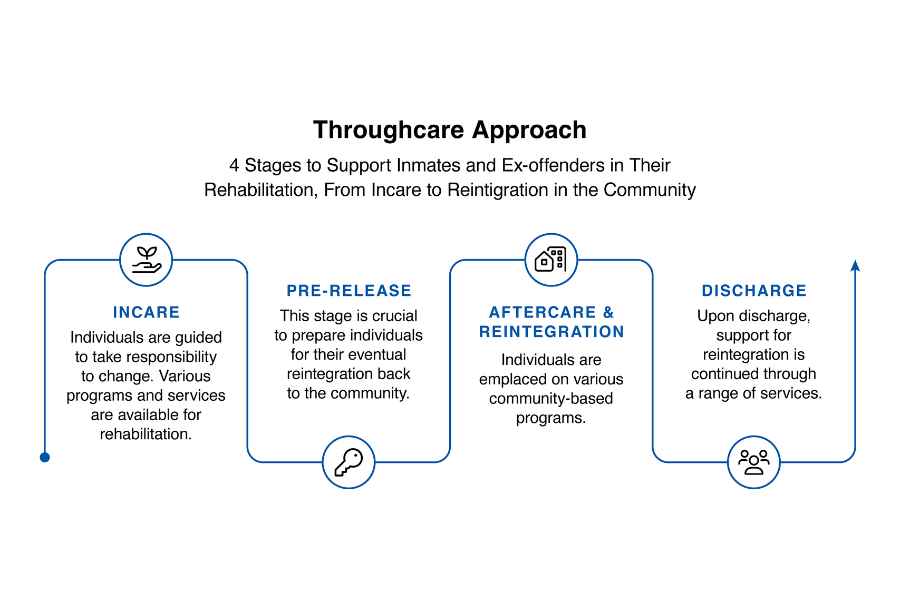
Caroline Lim, Director of Rehabilitation and Reintegration with the Singapore Prison Service (SPS), recently presented a workshop on “Community Partnerships and Mobilisation in Corrections” at the American Correctional Association Annual Conference. Her presentation summarized the transformation journey that SPS has taken over the last twenty years. Her presentation was engaging and shared how comprehensive community partnerships and inclusion of both individual and organizational volunteers can assist in the change process with justice-involved individuals. It is noteworthy that during the twenty-year transformation process, SPS has documented a reduction in the two-year recidivism rate from 40.1% in 2000 to 20% in 2019.
The SPS transformation journey has included a series of reforms and mindset changes. When the “Captains of Lives” was presented by SPS at the 2019 IACFP International Mental Health Leadership Network inaugural meeting, other mental health leaders were captivated by how it engaged all employees and community members in a singular focus on change and culture. Since then, the reforms have included “rehab, renew, restart” and “turning sentences into new chapters.” All of these reforms and mindset changes have been incorporated into a throughcare approach that affords transformation opportunities for justice-involved individuals as well as for SPS as an organization.
Singapore Prison Service's Throughcare Approach
The throughcare approach has four stages:
- Incare
- Pre-release
- Aftercare and Reintegration
- Discharge and Reintegration
In each stage there is strong community support to help individuals to live crime-free and productive lives. Community partners include the following:
Halfway Houses
Businesses and Corporations
Social Services
Boards and Communities
Academic Tutors
Grassroots Organizations
Government Agencies
Individuals
Befrienders
Desistors
Volunteer Engagement
In sheer numbers, there are over 3,000 volunteers working with justice-involved individuals within SPS; a number that translates to more volunteers than staff. These volunteers may offer religious programmes and community connections, support for family needs, job skills training and employment, arts-based programming, and other services and supports for desistance.
Three areas of volunteer engagement and community partnership are worth noting because they address areas where many justice-involved individuals experience challenges and where governmental organizations experience challenges in providing support.
Area One: Family Support
The first of these is in the area of family support. SPS staff triage new admissions to prison and identify family needs (e.g., elderly parents, children, etc.). They then make referrals to family service centers in the community. Family-centric organizations are viewed as important SPS partners. In addition, a Family Resource Center is located in Family Link at the prison.
The Yellow Ribbon Community Project (YRCP), discussed later, also kicks in when the individual comes to prison. If they are interested, grassroots volunteers will work with their families. In a YouTube video that included the stories of these volunteers, many shared that they offer a “listening ear,” “empathy,” and “help people facing dilemmas.” One shared that when they visit next of kin, they may simply be doing a kind thing, holding their hand, and being a presence that encourages them to feel that there are people who care and want to help them. The message is “hope is not lost.” There are 1,200 volunteers through YRCP.
Area Two: Befriending
The second unique area of volunteer engagement is in the “Befriending Programme.” This area utilizes both organizations and individual volunteers; currently 6 and 450, respectively. The purpose of this programme is to offer prosocial support from incare to aftercare. Two specific groups that especially benefit from the befriending programme are elderly offenders and those individuals with mental health issues.
Area Three: The Private Sector
The third unique area of volunteer engagement is with the private sector, specifically Yellow Ribbon SG and the Yellow Ribbon Project. Yellow Ribbon SG collaborates with more than 7,000 partners in the private, public, and people sectors to provide skills training and employment assistance to inmates and ex-offenders. There are more than 6,000 employers registered with the YRSG job bank, which offers more than 1,000 job vacancies each month. The overall purpose is to unlock the second prison (i.e., the psychological and social prison in the community).
There are a multitude of specific volunteer efforts throughout the incare process. These include but are not limited to an arts-based program, a desistors network, utilizing technology to provide video program recordings (in response to COVID restrictions to prevent transmission), religious programmes, Toki Formation pottery making, and a CARE (Community Action for the Rehabilitation of Ex-offenders) network that includes more than 100 partners.
Summarizing the Singapore Prison Service Model
SPS clearly values community partnerships and demonstrates this through engagement, appreciation, training, and development of volunteers. They are also co-creating all of these efforts with the community. Together they are building better solutions. Dialogue, recognition and engagement occurs with prison management, with department management, and at the ministry and national levels.
This incredible community partnership is built upon shared beliefs in forgiveness, second chances, and acceptance. There is an abundance mindset that looks beyond the talents and resources of staff to identify assets within the community as well. And, they have committed to sustaining desistance in the long-term through volunteers. These efforts are producing incredible results with justice-involved individuals and reaping the rewards of community support.
* References available upon request.

Cherie Townsend is the IACFP Executive Director. She also works as an executive coach and consultant. Ms. Townsend previously worked as a leader and practitioner in juvenile justice systems for nearly 40 years.

